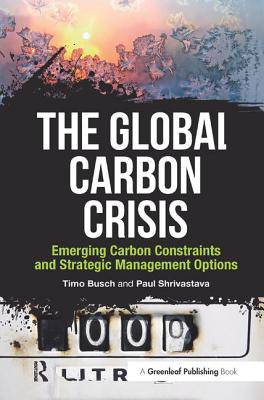
- Retrait gratuit dans votre magasin Club
- 7.000.000 titres dans notre catalogue
- Payer en toute sécurité
- Toujours un magasin près de chez vous
- Retrait gratuit dans votre magasin Club
- 7.000.0000 titres dans notre catalogue
- Payer en toute sécurité
- Toujours un magasin près de chez vous
The Global Carbon Crisis
Emerging Carbon Constraints and Strategic Management Options
Timo Busch, Paul Shrivastava
Livre relié | Anglais
54,45 €
+ 108 points
Description
For at least a decade the science of climate change has warned us of the dire need for action - particularly by corporations who are the main engines of economic production and consumption. Yet managerial and corporate understanding of climate change and related energy issues remains fragmented and present actions lack the urgency this critical problem deserves. There is a whole new economy - the low-carbon economy - looming on the horizon. But our consumption and production patterns remain in a carbon-locked position. What we are risking is a global carbon crisis and a case of history repeating. Humankind's failure to adequately recognise the onset of and address the effects of the global financial crisis mirrors our similar failures with the carbon crisis. There are many parallels: both are and were predictable and both will have direct implications on humanity on a sweeping, indiscriminate and severe scale. The difference is that we cannot reverse the effects of climate change and fossil fuel scarcity as easily as we can repair the global financial system. It is of paramount importance that we wake up to the risks and begin tackling the issues early enough. To successfully address the risks, business needs to be aware of the consequences that a changing climate and finite carbon resources will have on their business performance. The element carbon - both as a resource and as an emission - is both an economic threat as well as an opportunity for companies. It is a threat for carbon-intense production systems that will need to be changed to avoid further harmful climatic change, and take into account the limited availability of carbon-based fuels. At the same time, new opportunities will emerge for companies who can creatively design and produce goods and services that fit the new emerging carbon-constrained business environment. Many sectors of the economy - for example, renewable energy, energy and resources conservation, waste reduction and management, carbon finance markets - will expand rapidly, as other carbon- and resource-intensive sectors decline. The Global Carbon Crisis succinctly translates important insights from the natural sciences, economics and equity discussions, for the business reader. It reviews important aspects of these discussions and clarifies misunderstandings with respect to climate change and fossil fuel availability and their implications for business. The book provides simple, direct, pragmatic and effective solutions that policy-makers and corporate managers can implement. The aim is to provoke action - thoughtful action - towards developing a low-carbon future for companies on three levels. At the macro level, the authors discuss the importance of tough industrial policies for climate change and propose the idea of an international carbon-equal fund. At the meso level, they elaborate on the role of inter-firm collaborations for establishing low-carbon industries and production systems. At the micro level, they illustrate the virtue of proactive carbon strategies and suggest a corporate carbon management framework. Getting the message of the carbon crisis across to a business audience has proved challenging. This book successfully makes the case that they are intricately connected to one another and practising managers and business students will benefit from viewing the carbon crisis in parallel to the financial meltdown. The book will be essential reading for all businesses grappling with carbon-related issues and for many in academia, including those in management, strategy, finance, corporate social responsibility and sustainable development, globalisation and innovation studies.
Spécifications
Parties prenantes
- Auteur(s) :
- Editeur:
Contenu
- Nombre de pages :
- 208
- Langue:
- Anglais
Caractéristiques
- EAN:
- 9781906093617
- Date de parution :
- 01-07-11
- Format:
- Livre relié
- Format numérique:
- Genaaid
- Dimensions :
- 155 mm x 239 mm
- Poids :
- 566 g

Les avis
Nous publions uniquement les avis qui respectent les conditions requises. Consultez nos conditions pour les avis.






